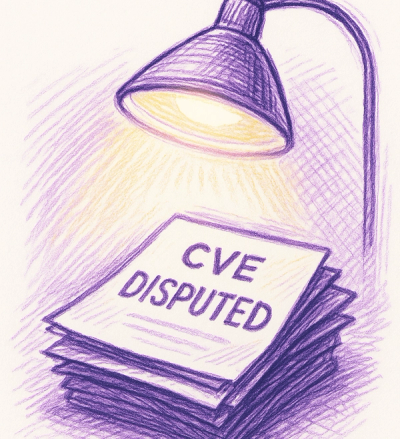
Security News
Google’s OSV Fix Just Added 500+ New Advisories — All Thanks to One Small Policy Change
A data handling bug in OSV.dev caused disputed CVEs to disappear from vulnerability feeds until a recent fix restored over 500 advisories.
github.com/justinbeckwith/gcloud-golang
import "google.golang.org/cloud"
NOTE: These packages are under development, and may occasionally make backwards-incompatible changes.
NOTE: Github repo is a mirror of https://code.googlesource.com/gocloud.
Go packages for Google Cloud Platform services. Supported APIs are:
| Google API | Status | Package |
|---|---|---|
| Datastore | beta | google.golang.org/cloud/datastore |
| Storage | beta | google.golang.org/cloud/storage |
| Pub/Sub | experimental | google.golang.org/cloud/pubsub |
| Bigtable | stable | google.golang.org/cloud/bigtable |
| BigQuery | experimental | google.golang.org/cloud/bigquery |
| Logging | experimental | google.golang.org/cloud/logging |
Experimental status: the API is still being actively developed. As a result, it might change in backward-incompatible ways and is not recommended for production use.
Beta status: the API is largely complete, but still has outstanding features and bugs to be addressed. There may be minor backwards-incompatible changes where necessary.
Stable status: the API is mature and ready for production use. We will continue addressing bugs and feature requests.
Documentation and examples are available at https://godoc.org/google.golang.org/cloud
Visit or join the google-api-go-announce group for updates on these packages.
We support the two most recent major versions of Go. If Google App Engine uses
an older version, we support that as well. You can see which versions are
currently supported by looking at the lines following go: in
.travis.yml.
By default, each API will use Google Application Default Credentials for authorization credentials used in calling the API endpoints. This will allow your application to run in many environments without requiring explicit configuration.
Manually-configured authorization can be achieved using the
golang.org/x/oauth2 package to
create an oauth2.TokenSource. This token source can be passed to the NewClient
function for the relevant API using a
cloud.WithTokenSource
option.
Google Cloud Datastore (docs) is a fully- managed, schemaless database for storing non-relational data. Cloud Datastore automatically scales with your users and supports ACID transactions, high availability of reads and writes, strong consistency for reads and ancestor queries, and eventual consistency for all other queries.
Follow the activation instructions to use the Google Cloud Datastore API with your project.
https://godoc.org/google.golang.org/cloud/datastore
First create a datastore.Client to use throughout your application:
client, err := datastore.NewClient(ctx, "my-project-id")
if err != nil {
log.Fatalln(err)
}
Then use that client to interact with the API:
type Post struct {
Title string
Body string `datastore:",noindex"`
PublishedAt time.Time
}
keys := []*datastore.Key{
datastore.NewKey(ctx, "Post", "post1", 0, nil),
datastore.NewKey(ctx, "Post", "post2", 0, nil),
}
posts := []*Post{
{Title: "Post 1", Body: "...", PublishedAt: time.Now()},
{Title: "Post 2", Body: "...", PublishedAt: time.Now()},
}
if _, err := client.PutMulti(ctx, keys, posts); err != nil {
log.Fatal(err)
}
Google Cloud Storage (docs) allows you to store data on Google infrastructure with very high reliability, performance and availability, and can be used to distribute large data objects to users via direct download.
https://godoc.org/google.golang.org/cloud/storage
First create a storage.Client to use throughout your application:
client, err := storage.NewClient(ctx)
if err != nil {
log.Fatal(err)
}
// Read the object1 from bucket.
rc, err := client.Bucket("bucket").Object("object1").NewReader(ctx)
if err != nil {
log.Fatal(err)
}
defer rc.Close()
body, err := ioutil.ReadAll(rc)
if err != nil {
log.Fatal(err)
}
Google Cloud Pub/Sub (docs) allows you to connect your services with reliable, many-to-many, asynchronous messaging hosted on Google's infrastructure. Cloud Pub/Sub automatically scales as you need it and provides a foundation for building your own robust, global services.
https://godoc.org/google.golang.org/cloud/pubsub
// Publish "hello world" on topic1.
msgIDs, err := pubsub.Publish(ctx, "topic1", &pubsub.Message{
Data: []byte("hello world"),
})
if err != nil {
log.Println(err)
}
// Pull messages via subscription1.
msgs, err := pubsub.Pull(ctx, "subscription1", 1)
if err != nil {
log.Println(err)
}
Contributions are welcome. Please, see the CONTRIBUTING document for details. We're using Gerrit for our code reviews. Please don't open pull requests against this repo, new pull requests will be automatically closed.
Please note that this project is released with a Contributor Code of Conduct. By participating in this project you agree to abide by its terms. See Contributor Code of Conduct for more information.
FAQs
Unknown package
Did you know?

Socket for GitHub automatically highlights issues in each pull request and monitors the health of all your open source dependencies. Discover the contents of your packages and block harmful activity before you install or update your dependencies.

Security News
A data handling bug in OSV.dev caused disputed CVEs to disappear from vulnerability feeds until a recent fix restored over 500 advisories.

Research
/Security News
175 malicious npm packages (26k+ downloads) used unpkg CDN to host redirect scripts for a credential-phishing campaign targeting 135+ organizations worldwide.

Security News
Python 3.14 adds template strings, deferred annotations, and subinterpreters, plus free-threaded mode, an experimental JIT, and Sigstore verification.